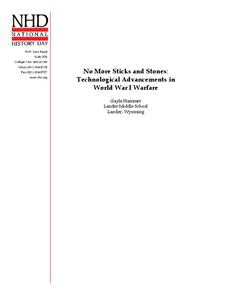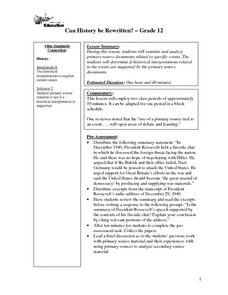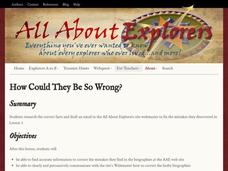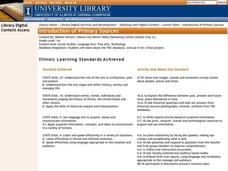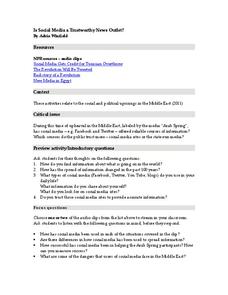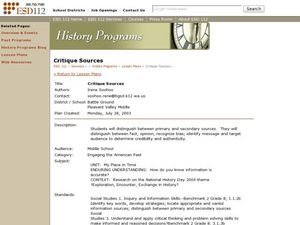National History Day
No More Sticks and Stones: Technological Advancements in World War I Warfare
Remind young historians that many technological advancements influenced the events of World War I. After analyzing technology's evolution through primary sources, discussing the changes over time, and watching various video clips,...
Advocates for Human Rights
Nativism and Myths about Immigrants
Where do anti-immigrants myths come from, and how can they be refuted? Learners critically analyze media reports and how to identify reliable sources. After studying a timeline that details the history of US nativism, groups research the...
Curated OER
But Where Is It On This Modern Map? A problem-solving, mind-boggling experience!
Trace Columbus' voyages by locating them on 21st Century maps. Using a navigators lesson, 4th graders will examine the Age of Exploration and trace Columbus's routes accurately on laminated world maps using different maps. Note: You...
Curated OER
Can History Be Rewritten?
Can history be rewritten? Or, more precisely, is history documented accurately? High school juniors and seniors compare primary source material with secondary sources. For example, they compare President Roosevelt's December 29, 1940...
Syracuse University
American Industrial Revolution
While the Industrial Revolution may have fueled America's rise to the top of world markets, the child laborers often faced dangerous conditions. Using primary source images and other information, scholars consider what these children...
EngageNY
TASC Transition Curriculum: Workshop 12
How can opinions slant facts? Workshop participants learn how to examine primary and secondary sources and identify the author's point of view. They also examine how visual art impacts the meaning and rhetoric of sources. Full of...
All About Explorers
How Could They Be so Wrong?
If it's on the Internet, it must be true ... right? Introduce young Internet explorers to the importance of fact-checking through a fun web-based activity. Pairs work together to read and analyze biographies about world explorers, then...
Albert Shanker Institute
Economic Causes of the March on Washington
Money can't buy happiness, but it can put food on the table and pay the bills. The first of a five-lesson unit teaches pupils about the unemployment rate in 1963 and its relationship with the March on Washington. They learn how to create...
Curated OER
Past Imperfect: Examining Secondary Sources of the American Revolution
Ninth graders respond in essay form to the following writing prompt. Mel Gibson, star of The Patriot, is quoted as stating, "If one were to adhere to historical accuracy all the way, you'd probably have the most boring two hours on...
Curated OER
Activity 10: Primary and Secondary Sources
Students sort documents into primary and secondary sources and analyze their reliability. In this history research lesson, the teacher gathers a selection of document images, then discusses primary and secondary sources and their benefits.
Curated OER
Introduction of Primary Sources
First graders examine a database to explain the use of primary source documents.
National History Day
Challenging the Status Quo: Women in the World War I Military
Why are some so resistant to change? The status quo is often to blame for a lack of forward movement in society. Following the events of World War I, women in America suddenly had a voice—and were going to use it. Scholars use the second...
Curated OER
Is Social Media a Trustworthy News Outlet?
Examine the role of social media in social and political uprisings. Pupils listen to NPR audio clips about social media and the Arab Spring and read an article that proposes the idea that revolution will not happen through social media....
Curated OER
Historical Locations of The Civil Rights Movement
A geographic perspective helps historians learn about significant eras such as the civil rights movement. Through research and source analysis, learners create a report depicting a significant location of this time. They synthesize their...
National History Day
“War Is Hell. We Know it Now.” American Soldiers in the Meuse-Argonne Offensive
Understanding the soldier's experiences during World War I sometimes takes a newscast. Learners see the importance of understanding multiple points of view with a newscast project surrounding the Meuse-Argonne Offensive. Compare and...
Smithsonian Institution
Two Perspectives on the Battle of Little Bighorn/Greasy Grass
Learners understand why historians conduct research and the importance of perception when it comes to studying history. The resource covers The Wars of Expansion and the Battle of Little Bighorn/Greasy Grass through group work, debate,...
Channel Islands Film
Lone Woman of San Nicolas Island: Lesson Plan 1
As a practice writing test, fourth graders use the West of the West's documentary Lone Woman of San Nicolas Island and two print resources as source materials for an informative article that identifies information that is historically...
Curated OER
Strategic Skill: Evaluating Information Quality Using Electronic Sources
Fourth graders review and complete evaluating information quality. In groups, they research the diversity of the numerous Native American tribes in Montana. They complete a worksheet on evaluating sources on the Internet and share...
Curated OER
Critique Sources
Young scholars distinguish between primary and secondary sources. They study about fact, opinion, and recognize bias. Students find out if information is accurate or not and report on it. For the final project young scholars create an...
Curated OER
Primary Resources
Primary Resources offers free lessonplan for teachers, throughout the year the site supplies information and will accept incoming lessonplans to its data base.Teachers can keep updated at primary resources by subscribing to RSS feeds.
Curated OER
Note taking on Sources Other Than Text
Students examine different sources of information. They evaluate and take notes from a variety of sources.
Curated OER
Journalism: Quoting Sources
Students examine the use of sources and their quotes in news writing. They determine the reasons specific persons are used as sources and why their opinions are relevant to the article. In groups, they identify sources in articles and...
Syracuse University
Ancient World Writing System
Most twenty-first century pupils don't know how to interpret cuneiform. Examining images of cuneiform and papyrus writing and using a chart and Venn diagram, young historians extrapolate what life may have been like for people who lived...
Syracuse University
World War I
World War I was known for its gruesome battlefields and horrific injuries. Using photographs from a battlefield surgeon's scrapbook, scholars see first-hand what life was like in the trenches. After creating a timeline of the war using...


